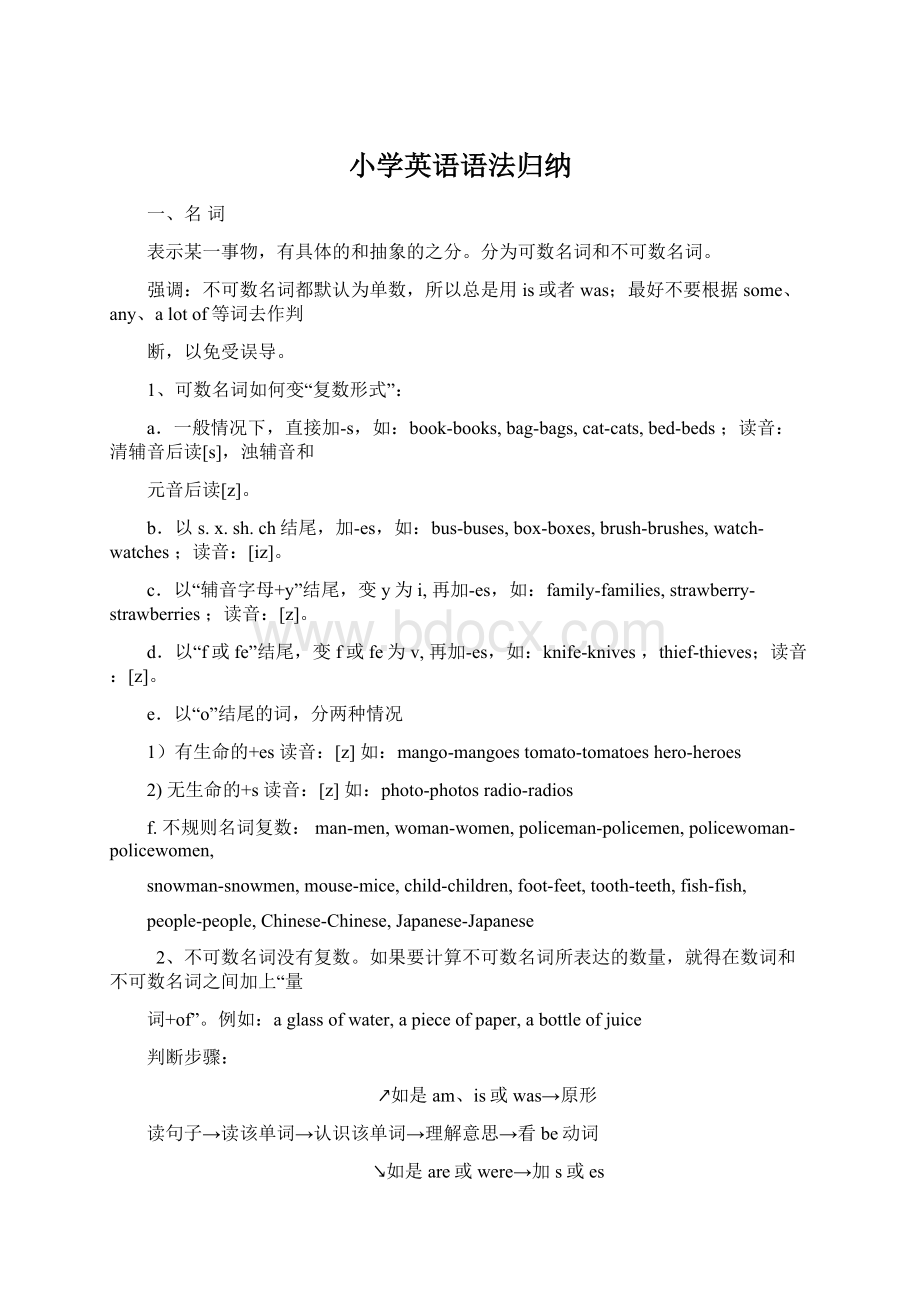小学英语语法归纳.docx
《小学英语语法归纳.docx》由会员分享,可在线阅读,更多相关《小学英语语法归纳.docx(28页珍藏版)》请在冰豆网上搜索。

小学英语语法归纳
一、名词
表示某一事物,有具体的和抽象的之分。
分为可数名词和不可数名词。
强调:
不可数名词都默认为单数,所以总是用is或者was;最好不要根据some、any、alotof等词去作判
断,以免受误导。
1、可数名词如何变“复数形式”:
a.一般情况下,直接加-s,如:
book-books,bag-bags,cat-cats,bed-beds;读音:
清辅音后读[s],浊辅音和
元音后读[z]。
b.以s.x.sh.ch结尾,加-es,如:
bus-buses,box-boxes,brush-brushes,watch-watches;读音:
[iz]。
c.以“辅音字母+y”结尾,变y为i,再加-es,如:
family-families,strawberry-strawberries;读音:
[z]。
d.以“f或fe”结尾,变f或fe为v,再加-es,如:
knife-knives,thief-thieves;读音:
[z]。
e.以“o”结尾的词,分两种情况
1)有生命的+es读音:
[z]如:
mango-mangoestomato-tomatoeshero-heroes
2)无生命的+s读音:
[z]如:
photo-photosradio-radios
f.不规则名词复数:
man-men,woman-women,policeman-policemen,policewoman-policewomen,
snowman-snowmen,mouse-mice,child-children,foot-feet,tooth-teeth,fish-fish,
people-people,Chinese-Chinese,Japanese-Japanese
2、不可数名词没有复数。
如果要计算不可数名词所表达的数量,就得在数词和不可数名词之间加上“量
词+of”。
例如:
aglassofwater,apieceofpaper,abottleofjuice
判断步骤:
↗如是am、is或was→原形
读句子→读该单词→认识该单词→理解意思→看be动词
↘如是are或were→加s或es
练一练:
1、写出下列各词的复数。
I_________ him_________ this_______ her______ watch_______ mango_______child_______photo________diary______ day________ foot________dress________tooth_______
sheep______ box_______ strawberry_____thief_______engineer______peach______
sandwich______ man______ woman_______ leaf_______ people________
2、用所给名词的正确形式填空。
(1)Aretheretwo (box)onthetable?
(2)Icanseesome (people)inthecinema.
(3)Howmany (day)arethereinaweek?
(4)Here’refive (bottle)of (juice)foryou.
(5)This (violin)ishers.Those (grape)areoverthere.
二、冠 词
冠词是一种虚词,不能独立使用,通常放在名词的前面,分为“不定冠词”和“定冠词”两种。
1、不定冠词:
a、an。
用在单数名词前,表示“一个,一件……”。
an用在以元音“音素”开头的单词前。
如:
ane-mail,anorange,anoldman,anEnglishwatch,anhour…
2、定冠词:
the。
用在单数或者复数名词前。
the没有具体意思,有时翻译为这、那。
它的基本用法:
(1)用来表示特指某(些)人或某(些)事物。
如:
Themaponthewallisnew.
(2)表示说话者双方都知道的人或事物。
如:
Lookatthepicture,please.
(3)表示再次提到前面谈过的人或事物。
如:
Thisisastamp.Thestampisbeautiful.
(4)用在表示世界上独一无二的事物前。
如:
thesun太阳 themoon月亮 theearth地球
(5)用在由普通名词构成的专有名词前。
如:
theGreatWall长城
(6)用在江河、湖海等专有名词前。
如:
theChangjiangRiver长江
(7)此外,序数词、形容词最高级、乐器名称等词前面和一些习惯用语中一般都用定冠词the。
如:
thefirstday,thebestboy,playthepiano,inthesameclass
确定用a、an还是the时可根据汉语意思。
练一练:
1、用a或an填空。
____“U” ____ice-cream ____ goalkeeper ____teapot ____apple
____office ____Englishbook ____umbrella____unit ____hour
2、根据需要,填写冠词a,an或the。
(1)Whois ____girlbehind ____tree?
(2) ____oldmanhastwochildren, ____sonand ____daughter.
(3)Thisis ____orange. ____orangeisLucy’s.
(4)Helikesplaying ____guitar.Wehave ____samehobby.
(5)Weallhad____goodtimelastSunday.
(6)Shewantstobe____doctor.
三,数词
我们学过两类:
基数词和序数词。
基数用于表示数量多少,而基数词用于表示次序,常在日期中出现。
区别:
基数词前面没有“the”;序数词前一定要有“the”。
1、超过二十以上的两位数需要在个位和十位之间加上“-”。
如:
21 twenty-one
2、三位数以上的则需要在百位数后再加上and。
如:
101 a/onehundredandone
3、用基数词来修饰可数名词时,一定别忘了它的复数形式。
如:
十八个男孩 eighteenboys
4、用基数词修饰不可数名词时,如是复数,变它的量词为复数。
如:
两碗米饭 twobowlsofrice
5、序数词一般加“th”,特殊的有:
first,second,third,fifth,eighth,ninth,twelfth以及二十及二
十以外的整十:
twentieth,thirtieth,fortieth…“第几十几”:
前面整十不变,后面“几”改为序
数词。
如:
88 eighty-eighth
练一练:
1、请翻译下列短语。
(1)60名学生
(2)15本英语书
(3)九杯凉水 (4)4个孩子
(5)12月31 (6)6月2日
(7)第九周 (8)40年前
(9)11+7 (10)上学第一天
2、把下列基数词改成序数词。
one--- two--- three--- nine---
fourteen--- twenty--- thirty-five--- eighty-one
四、代 词
代词有两种:
人称代词和物主代词。
1、人称代词分为:
第一、第二、第三人称,且有单复数之分。
2、人称代词的主格在句中做主语,一般用在动词前(疑问句除外);宾格在句中做宾语,多
用于动词、介词后。
3、形容词性物主代词起形容词的作用,后面一定要跟名词,表示该名词是属于谁的。
4、名词性物主代词=形容词性物主代词+名词。
如:
Thisismybag.=Thisismine. Thatisherruler.=Thatishers.
一般看后面有没有名词,如有,就用形容词性物主代词;如无,就用名词性物主代词。
请牢记下表:
单数
复数
人称代词
主格
I
you
he
she
it
we
you
they
宾格
me
you
him
her
it
us
you
them
物主代词
形容词性
my
your
his
her
its
our
your
their
名词性
mine
yours
his
hers
its
ours
yours
theirs
练一练:
1、按要求写出相应人称代词。
I(宾格)_______ she(形容词性物主代词)_______ we(名词性物主代词)_______
he(复数)_______ us(单数)_______ theirs(主格)_______its(宾格)_______
2、想一想,把下表补充完整。
人称代词
物主代词
单数
复数
单数
复数
主格
宾格
主格
宾格
形容词性
名词性
形容词性
名词性
第一人称
me
us
our
第二人称
you
you
第三人称
he
them
his
their
her
it
its
3、用所给词的适当形式填空。
1)Thatisnot_________kite.Thatkiteisverysmall,but_________isverybig.(I)
2)Thedressis_________.Giveitto_________.(she)
3)Isthis_________watch?
(you)No,it’snot_________.(I)
4)_________ismybrother.________nameisJack.Look!
Thosestampsare_________.(he)
5)_________dressesarered.(we)Whatcolourare_________?
(you)
6)Show_________yourkite,OK?
(they)
7)Ihaveabeautifulcat._________nameisMimi.Thesecakesare_________.(it)
8)Arethese________tickets?
No,________arenot_________.________aren’there.(they)
9)Shall_________havealookatthatclassroom?
Thatis_________classroom.(we)
10)_________ismyaunt.Doyouknow_________job?
_________isanurse.(she)
11)Whereare_________?
Ican’tfind_________.Let’scall_________parents.(they)
12)Don’ttouch_________._________isnotacat,_________isatiger!
(it)
13)_________sisterisill.Pleasegoandsee_________.(she)
14)Thegirlbehind_________isourfriend.(she)
五、形容词、副词
1、形容词表示某一事物或人的特征,副词表示某一动作的特征。
形容词和副词有三种形式:
原形、比较
级、最高级。
比较级:
+er 最高级:
the…+est
两个重要特征:
as……as中间一定用原形,than的前面一定要+er。
2、形容词、副词比较级的规则变化如下:
(1)一般直接+er。
如:
tall-taller,fast-faster 单音节词如果以-e结尾,只加-r。
如:
late-later
(2)重读闭音节词如末尾只有一个辅音字母,须双写这个字母,再加-er。
如:
big-bigger,fat-fatter
(3)以辅音字母加-y结尾的词,变y为i,再加-er。
如:
heavy-heavier,early-earlier
(4)双音节和多音节词的比较级应在原级前加more构成。
如:
beautiful-morebeautiful,
careful-morecareful,quietly-morequietly,interesting-moreinteresting
(5)有些不规则变化的,须逐一加以记忆。
如:
good/well–better,bad/ill–worse,many/much–more,far–farther/further,old–older/elder…
练一练:
1、写出下列形容词、副词的比较级。
big good long tall old
short thin heavy young fat
light strong high far low
early late well fast slow
2、用括号内所给单词的适当形式填空。
1)Icanswimas _______(fast)asthefish,Ithink.
2)Look!
Hishandsare _______ (big)thanmine.
3)Ithinkyoudothesethings_______(well)thanyourclassmates.
4)Whosebagis _______(heavy),yoursormine?
5)DoesJimrunas _______(slow)asDavid?
Yes,butMikeruns_______(slow)thanthem.
6)Youhavesevenbooks,butIhave _______(many)thanyou.Ihaveten.
7)Ijump _______(far)thansomeoftheboysinmyclass.
8)I’mvery_______(thin),butshe’s _______(thin)thanme.
9)Itgets _______and_______(warm)whenspringcomeshere.
六、介 词
1、一种虚词。
不能单独作句子成分,它只有跟它后面的宾语一起构成介词短语,才能在句子中起作用。
有:
in,on,under,with,behind,about,near,before,after,for,to,up,down,from,infrontof,outof,
from…to…,atthebackof…
2、表示时间的介词有:
at,on,in。
(1)at表示“在某一个具体的时间点上”,或用在固定词组中。
如:
atten
o’clock,at9:
30a.m.,atnight,attheweekend…
(2)on表示“在某日或某日的时间段”。
如:
onFriday,onthe
firstofOctober,onMondaymorning…(3)in表示“在某一段时间(月份、季节)里”。
如:
intheafternoon,
inSeptember,insummer,in2005…
3、in一词还有其他的固定搭配,如:
inblue(穿着蓝色的衣服),inEnglish(用英语表达),takepartin(参加)。
练一练:
1、选用括号内恰当的介词填空。
1)What’sthis _______(at,on,in)English?
2)Christmasis _______(at,on,in)the25thofDecember.
3)Theman_______(with,on,in)blackisSuHai’sfather.
4)Hedoesn’tdowell _______(at,on,in)PE.
5)Lookatthosebirds _______(on,in)thetree.
6)Wearegoingtomeet _______(at,on,in)thebusstop _______(at,on,in)halfpastten.
7)Isthereacat _______(under,behind,in)thedoor?
8)Helen’swritingpaperis _______(in,infrontof)hercomputer.
9)Welive _______(at,on,in)anewhousenow.
10)Doesitoftenrain _______(at,on,in)springthere?
2、圈出下列句子中运用不恰当的介词,并将正确的答案写在横线上。
1)JimisgoodinEnglishandMaths. 2)Thefilmswereinthegroundjustnow.
3)Theyaretalkingtotheirplans. 4)HowmanystudentshavetheirbirthdaysonMay?
5)Women’sDayisatthethirdofMarch. 6)Icanjogtoschoolonthemorning.
7)Didyouwatertreesatthefarm?
8)CanyoucomeandhelpmeonmyEnglish?
9)IusuallytakephotosinSundaymorning. 10)WhatdidyoudoontheSpringFestival?
七、动 词
这里所说的动词是指各种动词总称,其中包括be动词、情态动词、助动词、行为动词(就是我们平时总说的那种动词)。
动词、名词和形容词不太容易区分,如不能一眼看出,可用如下方法:
先用“一(量词)”(如:
一个、一张等)和这个词连起来说,如说得通,一般认为是名词;说不通再用“很”去判断,就是把“很”和为个词连起来说,说得通一般就是形容词;都说不通就是动词。
(目前我们学过的,以后可能不同)(另外一些很明显的,如人称代词、数词、情态动词等一下就可以知道)
1、be动词(am,is,are,was,were)
1)am—was,is–was,are--were口诀:
我用am,你用are,is用在他她它,所有复数全用are。
2)肯定和否定句Iam(not)fromLondon.Heis(not)ateacher.Sheis(not)inthediningroom.Myhairis(not)
long.Hereyesare(not)small.
3)一般疑问句AmIa